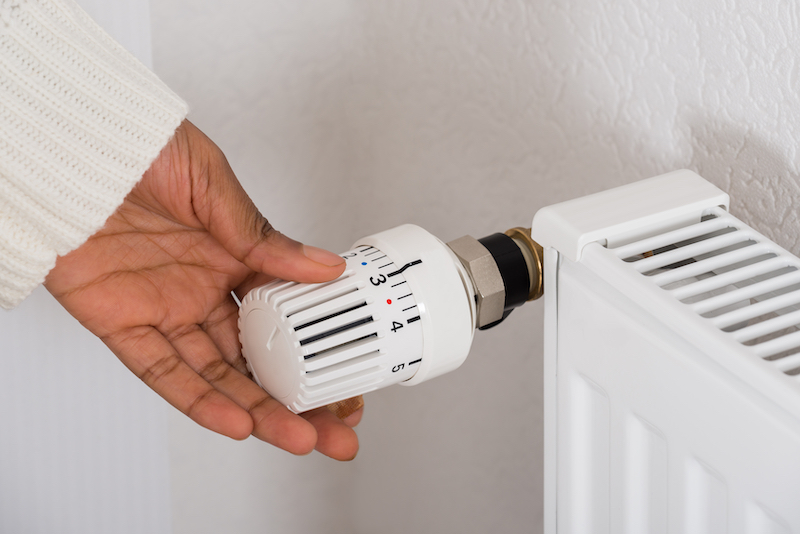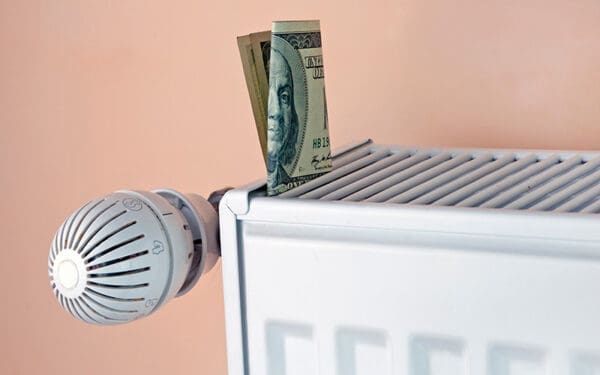
Now that the Affordable Heat Act is law, CLF will work to make sure it fulfills its goals of slashing polluting emissions from buildings and saving Vermonters money. Photo: Shutterstock.
An earlier version of this blog was published on April 19, 2023.
Good news, Vermont: The Affordable Heat Act has been signed into law. This new piece of legislation will put Vermont on a path toward slashing polluting emissions from our buildings and cleaning up Vermont’s heating fuel supply. With your support, we convinced the state House and Senate to override Governor Scott’s veto – for the sake of our health, wallets, and the climate we all depend on for our happiness and survival. Let’s dive into how this new law will affect Vermont.
How the Affordable Heat Act Would Work
Most Vermont households and businesses burn imported fossil fuels for heating. Over time and if done right, the Affordable Heat Act as law will wean us off high-cost, price-volatile, and climate-damaging heating fuels. This strategy is especially important given that heating our buildings is one of the largest sources of climate-polluting emissions in Vermont.
The law, when implemented, will require fossil fuel importers to offset their sales of heating fuels by obtaining clean heat credits. The more fossil fuels an importer brings to be burned for heating in Vermont, the more clean-heat credits they must earn to offset those polluting fuels.
Fossil fuel importers earn such credits by helping Vermonters switch their heating systems from fossil fuel-powered systems to cleaner, long-term cost-saving systems like cold-climate heat pumps, geothermal, solar-powered water heaters, or advanced wood heating systems. The owner controls and decides the timing of these switches based on when they are ready to replace their heating system. Importers can also earn credits by helping Vermonters weatherize their homes and businesses so they use less energy to stay warm, lowering annual costs for consumers. The result? The cleaner the energy we use, the less energy we use overall, and the less planet-warming emissions we produce.
One important element of the Affordable Heat Act is the law’s emphasis on social equity in this transition away from fossil fuel-based heating. Each year, fossil fuel importers will be required to ensure a certain percentage of clean heat credits they earn result from assisting low- and middle-income households weatherize homes and businesses and/or switch to cleaner heating sources. They will also be required to target assistance to renter households with tenant-paid energy bills.
The law would also create limitations and eventually phase down the eligibility of biofuels (fuels produced from crops like corn and soybean oils) for inclusion as clean heat measures. The only biofuels that will qualify as clean heat measures are those that are lower polluting than fossil fuels – not just when they’re burned, but also when they’re grown, constructed, transported, and disposed of.
This Law Can Help Vermont
The Affordable Heat Act is long overdue, and we’re excited to see it become law. It’s time because, for decades, the fossil fuel industry has put profits over people, all while denying climate reality. It’s a clever way to ensure we stay dependent on their product instead of transitioning towards clean, efficient energy.
And staying dependent, after all, is helping fossil fuel companies pull in record profits, even while Vermonters in the last two years have watched their heating bills skyrocket. The Affordable Heat Act correctly requires fossil fuel importers help Vermonters transition away from polluting, price-volatile heating fuels to reliable heating even during our coldest temperatures.
What’s Next for the Affordable Heat Act and CLF
The Affordable Heat Act charges Vermont’s Public Utilities Commission with conducting a public process to flesh out key elements of how the law will work. That process, scheduled over the next two years, will include members of the public and technical experts appointed under the law. These voices will assist the Commission in writing standards that will translate the Affordable Heat Act into a functioning program that slashes emissions while increasing financial incentives to Vermonters looking to reduce or eliminate their use of fossil fuels for heating. Critically, those standards cannot go into effect until at least 2025, after the Legislature and the Governor have had the opportunity to review, amend, and approve them.
CLF’s climate experts will be heavily involved in the Commission’s process to ensure that key provisions we helped negotiate are carried out with scientific integrity. We’ll be keenly focused on the implementation of the law’s requirements to rigorously evaluate all emissions at every stage: From their creation to their disposal. And we’ll also be scrutinizing the consequences and burdens of alternatives to fossil fuels, including biofuels and so-called “renewable natural gas,” so that only those providing a substantial climate benefit over fossil fuels can earn clean heat credits.
Today, we are celebrating this victory for Vermont. Tomorrow, we hit the road ensuring that the Affordable Heat Act fulfills its purpose to help Vermonters slash emissions and save money by moving away from fossil fuels. With your support, CLF will remain an actively engaged leader in the effort to make this innovative climate solution an effective model for New England and beyond.



